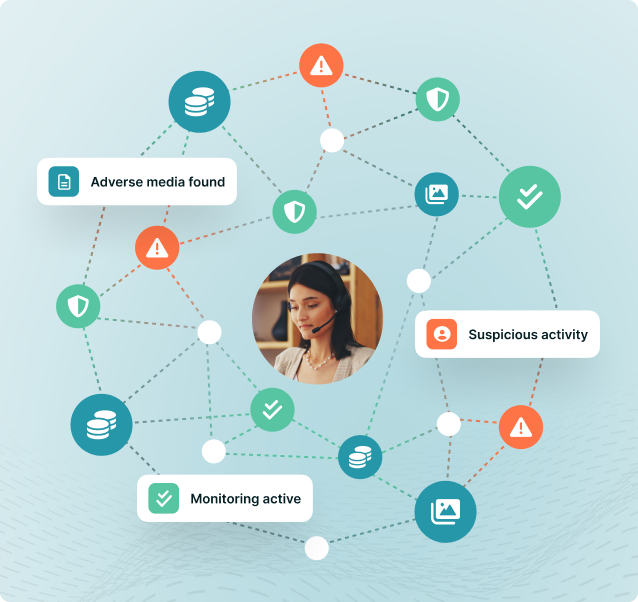Sanction Search and PEP Screening
What we do
Our automated platform enables you to perform Sanction searches and check PEP lists for PEPs and RCAs. It filters out false positives and alerts you upon confirming a match. Here's how PEP checks, PEP lists, and sanction searches work.

Get the help you need
The SmartSearch system completes Sanction and PEP screening on every AML check you perform, automatically triggering Enhanced Due Diligence on any matches. It then screens all customers every night and alerts you of any changes.
What is PEP and Sanction screening?
PEP and Sanction searches are part of the Customer Due Diligence (or KYC) process; individuals and businesses are identified and verified, and then their details are checked against sanction and PEP lists.
PEP and Sanction searches are part of the Customer Due Diligence (or KYC) process; individuals and businesses are identified and verified, ...
Why do you need to screen for Sanctions and PEPs?
PEP list and sanction searches are crucial for anti-money laundering. It is illegal to work with individuals on sanctions lists, and PEPs pose higher risks. Companies need to identify customers on these lists to assess legalities and risks of working with them.
PEP list and sanction searches are crucial for anti-money laundering. It is illegal to work with individuals on sanctions lists, and PEPs ...
What is RCA screening?
RCA stands for Relatives and Close Associates, defined as any individuals or businesses that are either related to or closely associated with a PEP. It’s important to identify RCAs as they may be vulnerable to bribery, blackmail and corruption due to their relationship with someone in a position of authority and influence.
RCA stands for Relatives and Close Associates, defined as any individuals or businesses that are either related to or closely associated ...
How do I conduct a Sanctions search?
PEP lists are publicly available, but keeping them updated manually is almost impossible due to the lack of a central source. The best way to conduct a sanction search is via an electronic AML platform with daily monitoring. SmartSearch uses the Dow Jones WatchList, accessing over 1,100 PEPs and sanctions lists updated daily.
PEP lists are publicly available, but keeping them updated manually is almost impossible due to the lack of a central source. The best way ...

What are Sanctions and PEPs?
- Sanctions restrict individuals and entities involved in illegal activities from certain industries. Issued by government bodies and financial authorities, sanctions lists screen individuals and organisations for financial sanctions.
- A PEP, or Politically Exposed Person, is someone who holds a prominent position in public life – for example, a senior member of government or law enforcement – making them more vulnerable to bribery and corruption.
-
Under UK regulations, UK Politically Exposed Persons (PEPs) are considered low-risk unless a firm has identified other factors that pose a higher risk. Therefore, firms must apply Enhanced Due Diligence requirements to UK PEPs and their families, as well as known close associates.
How to mitigate risks and monitor PEPs effectively

.png?width=855&height=855&name=UK%20Individual%20(2).png)

Bespoke packages to suit your business
We can create a tailor-made package to fit your needs and budget without compromising on functionality and service to ensure our unique AML solution is affordable to all businesses.
/SmartSearch_OfficeLifestyle_Feb25_115-1.jpg?width=950&height=950&name=SmartSearch_OfficeLifestyle_Feb25_115-1.jpg)
How do Sanction and PEP screening enhance the KYC process?

.png?width=855&height=855&name=UK%20Individual%20(2).png)
.png?width=855&height=855&name=UK%20Individual%20(2).png)
.png?width=855&height=855&name=UK%20Individual%20(2).png)
The necessity of sanction searches in fighting financial crime

Organisations must check if their clients are listed on a sanctions list before engaging in any type of financial transaction with them. By conducting stringent sanction searches with reliable databases and sources, they can ensure compliance with AML regulations.
To further fortify compliance, financial institutions must implement robust mechanisms for identifying and monitoring Politically Exposed Persons (PEPs) within their customer base. This involves thorough screening processes and ongoing due diligence to detect any changes in PEP status or behavior that may require further investigation.
PEP check and Sanction screenings with TripleCheck

Explore SmartSearch's advanced TripleCheck solution. Combining three of our most advanced technologies; market-leading AML checks, sophisticated facial recognition techniques and robust fraud checks, enabling firms to quickly and efficiently onboard new clients. Your business will benefit from:
- Real time monitoring and alerts
- Advanced risk analysis & reporting
- User-friendly interface
- In-house data hosting
Onboarding with SmartSearch has solved the issues we were experiencing, and we are happy all round. We needed an electronic service that was comprehensive and reliable, and we have this with SmartSearch.
D2 Financial ServicesThanks to the SmartSearch platform, Broadstone Insurance is now able to complete all its AML checks quickly and simply, a huge improvement in both productivity and cost-effectiveness compared to the old system.
BroadstoneThe onboarding process has allowed us to enhance our user experience, whilst improving compliance oversight without the need for manual intervention.
ACASTAServing professional AML regulated industries
Trusted by over 7,000 regulated businesses, SmartSearch's next-generation technology is the UK's leading solution for AML and risk management.
Ensuring Solicitors and Legal firms are AML compliant
- Benefit from industry-leading pass rates
- Enhance client relationships
- Protect your reputation
- Reduce compliance risk

Innovative AML solutions for Accountants
- Experience hassle-free AML and compliance
- Benefit from industry-leading pass rates
- Deliver a frictionless customer journey
- Streamline your onboarding process

AML checks for Estate Agents & Property companies
- Experience hassle-free AML and compliance
- Benefit from industry-leading pass rates
- Deliver a frictionless customer journey
- Streamline your onboarding process

Delivering AML compliance for Financial Services firms
-
Benefit from industry-leading pass rates
-
Accelerate your customer onboarding without compromising on compliance
-
Deliver a frictionless customer journey
-
Experience hassle-free AML and compliance

AML technology for Investment Banking
-
Benefit from industry-leading pass rates
- Accelerate your customer onboarding without compromising on compliance
- Deliver a frictionless customer journey
- Experience hassle-free AML and compliance

AML solutions for Insurance firms
-
Benefit from industry-leading pass rates
-
Accelerate your customer onboarding without compromising on compliance
- Deliver a frictionless customer journey
- Experience hassle-free AML and compliance

Innovative AML solutions for Gaming firms
Ensure safe gaming for your organisation with SmartSearch’s all-in-one AML platform.
-
Benefit from industry-leading pass rates
-
Accelerate your customer onboarding without compromising on compliance
-
Deliver a frictionless customer journey
- Experience hassle-free AML and compliance

AML and compliance for Banking organisations
-
Benefit from industry-leading pass rates
-
Accelerate your customer onboarding without compromising on compliance
-
Deliver a frictionless customer journey
- Experience hassle-free AML and compliance

AML solutions for Cryptocurrency firms
-
Benefit from industry-leading pass rates
-
Accelerate your customer onboarding without compromising on compliance
-
Deliver a frictionless customer journey
- Experience hassle-free AML and compliance

AML and compliance technology for Property Development firms
-
Experience hassle-free AML and compliance
-
Benefit from industry-leading pass rates
- Deliver a frictionless customer journey
-
Streamline your onboarding process

Types of Politically Exposed Persons

It can be difficult to determine and recognise a PEP since it varies between countries. However, the UK considers the following individuals as PEPs:
- Members of parliament
- Senior members of the government and government-owned companies
- Senior figures of the armed forces
-
High-profile members of law enforcement agencies
-
Board members of central banks
The help you need, when you need it
Whether you’re a small business just getting to grips with AML regulations or a large corporation with plenty of experience in compliance, SmartSearch can help you to comply with regulations, fight financial crime and grow your business with confidence.
-

Resource library
Explore our resource library for expert guides and tools to support your compliance processes.
-

Blogs
Discover our latest blog posts for expert tips, features, industry trends and more.
-

See it in action
Let one of our highly-trained sales team demonstrate the multi-award winning SmartSearch AML product.
/SmartSearch_OfficeLifestyle_Feb25_115.jpg?width=950&height=950&name=SmartSearch_OfficeLifestyle_Feb25_115.jpg)
Frequently Asked Questions
For companies to maintain an effective risk assessment process, they must keep up-to-date with the constantly changing sanctions lists from organisations such as the UN and EU, including any new entries or expungement.
Financial sanctions are legal restrictions, put in place by the government to limit or prevent entirely the trading of individuals, companies or whole countries. They are usually levied against people or corporations who have committed financial crimes and fall into one of three categories: the freezing of assets, specific restrictions on financial markets and orders to cease all trading.
Used by financial authorities and governments all over the world, sanctions lists are databases which detail all the financial sanctions that are currently active in a specific state, country or continent. Some of the most well-known examples in the industry are the United Nations list, the UK Consolidated list and the EU Consolidated list.
The UK Consolidated List, which is the most widely used official list of financial sanctions in the UK, details three types of sanctions. These are the following: targeted asset freezes, financial restrictions and directions to cease all business. Every country is legally obliged to adhere to any financial sanctions levied against it if it’s enforced by the relevant authorities (for example, the Office of Financial Sanctions Implementation in the UK).
Every country is legally obliged to adhere to any financial sanctions levied against it if it’s enforced by the relevant authorities (for example, the Office of Financial Sanctions Implementation in the UK).
If you fail to include a Sanctions search when carrying out your AML checks, you could end up unwittingly entering into business with a client or customer who is currently sanctioned. In the UK, having dealings with any sanctioned business or individual is illegal if those dealings break the terms of the arrangement, except in very specific circumstances when a licence is required. If you’re found out, the consequences can include substantial fines or even a prison sentence, as it’s considered an AML compliance failure.
Regardless of the circumstances, when collaborating with others, you must not partner with anyone who is sanctioned by the government. This includes their close family members and associates.
A PEP (Politically Exposed Person) check should be carried out when onboarding new customers to ensure that they are not linked to any form of financial crime. For example, if a customer is a government official or a family member of a government official, it is important to conduct a PEP check as such individuals may be involved in bribery or corruption. Additionally, a PEP check should be performed whenever changes are made that could trigger the need for additional verification. This could include changes in address, profession, or banking details which may indicate potential money laundering activity.
Organisations can legally provide services/products or choose to work with PEPs; it is their responsibility, however, to manage the risk associated with doing so. Regulated industries, especially those in the finance sector, are required to conduct PEP checks and sanctions screening as part of their Customer Due Diligence (CDD) during onboarding. After conducting their checks, they may require further verification before making a decision on whether or not to accept the customer. CDD steps are just a part of the Know Your Customer process. Failing to abide by the nation's AML protocols can result in financial penalties and even jail time.
The time frame a person is deemed to be a PEP may vary depending on their particular function, with designation potentially lasting up to a year after their official departure. To guarantee adherence and surveillance, a thorough assessment must be conducted into the individual and their prior connections before PEP status is cleared from them.
When onboarding a Politically Exposed Person according to Regulation 35 of the Money Laundering, Terrorist Financing and Transfer of Funds (Information on the Payer) Regulations 2017 (MLR 2017), you must: Secure approval from upper management for the business association. Ensure the origin of assets and funding is adequately investigated. Keep a close eye on the business relationship over time. Regulated businesses must ensure they meet KYC and AML regulations by performing PEPs and sanctions checks as part of their due diligence process.
RCA stands for Relatives and Close Associates, defined as any individuals or businesses that are either related to or closely associated with a PEP. It’s important to identify RCAs as they may be vulnerable to bribery, blackmail and corruption due to their relationship with someone in a position of authority and influence.
Ultimate Beneficial Owner (UBO) requirements revolve around identifying the individuals who ultimately own or control a company. This entails pinpointing the true stakeholders behind an organisation, regardless of how complex the ownership structure may be. The significance of these requirements lies in the realms of transparency and compliance, making them crucial for both legal and financial entities.
In the ever-evolving global financial landscape, regulatory compliance serves as a cornerstone of banking solutions. It is more than a mere formality; it's an active defense mechanism that protects against illegal activities and maintains the credibility of financial institutions worldwide. One key element of regulatory compliance is the identification and monitoring of politically exposed persons (PEPs). This process is essential to prevent financial crimes like money laundering and fraud. By implementing thorough sanctions screenings, banks not only adhere to legal requirements but also bolster their defenses against potential violations, which could result in hefty fines.